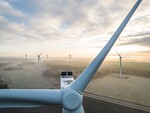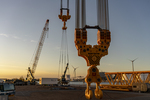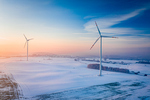01/12/2010
USA - Wineries turn to wind energy
When planning his new Anaba winery in Sonoma's Petaluma Gap, proprietor John Sweazey had to give very careful consideration to how to situate the tasting room's outdoor space. Strong winds come off the ocean two-thirds of the year, and the hills around his site act as a funnel. "On a windy day, it's not fun to be out there," he said. Without the shelter of the building and protective glass partitions, "if guests step outside, the wind will blow their wig off, or at least the wine out of their glass."
That's exactly what prompted Sweazey to put up a sleek 45-foot-high wind turbine on his 16-acre property in December, making Anaba the first winery in Northern California to do so. He estimates he will save about $1,000 a year on electricity for his tasting room, offices, case storage and irrigation system. The turbine is connected to the utility grid, so when the wind produces more power than Anaba is using, it's sold to the power company, offsetting the winery's annual bill.
"The economics worked relatively well," says Sweazey, who named his year-old brand after a type of wind. With a federal tax credit and a state rebate covering half of the expense, he expects the Skystream 3.7 turbine—which cost $21,000, with permits and set-up fees—to pay for itself in eight to 12 years. If all goes well, Sweazey hopes to add more turbines, along with solar power, when he builds a new production facility.
Across the nation, a handful of small U.S. wineries—ranging from Alaska to Texas, Oregon to Michigan to New York's Finger Lakes—are harnessing the wind with turbines, and more are planning to follow suit. New technology is making small-scale wind generation more affordable and efficient, as well as quieter and less obtrusive, while federal, state and local subsidies are helping farmers offset the initial costs. Vineyards are a very promising venue, says Russ Jonas, owner of Jonas Energy Solutions, which installed Anaba's turbine: "They are a great source because they have a low crop and cover wide areas with no obstacles."
In Napa Valley, Honig winery will supplement its solar power this spring with seven compact turbine cylinders that are 30 feet high; they have a 20-year lifespan and should produce a combined 10,800 kilowatt-hours annually to help power the irrigation system and winery water pumps. "I think they're going to complement each other really well," said Stephanie Honig. "The solar produces more energy during the hot summer days, while wind is going to be generating at times that solar might not be, in evenings, during the winter. When one is peaking, the other is not."
Smaller, Sleeker
Honig is using a new vertical turbine called Windspire, made by Mariah Power, a small company that is manufacturing them primarily from recycled materials in a retrofitted Michigan auto plant, employing former auto workers. "These machines aren't the big propellers you think of when you think of wind power," says Honig. "They're really pretty-looking—kind of like the [Alexander] Calder mobiles."
Vertical turbines may help counter concerns about installing wind power in residential areas or bird migration corridors. "The verticals are quieter than a heating and AC unit on the side of a house," said Jonas. "Visually, they're not whipping around up high." And unlike 150-foot-high, wind-farm installations that rotate so fast that the birds can't see the tip of the blades, verticals spin at much lower speeds so they are visible to birds.
Honig has applied for a USDA Rural Energy for America Program grant that could cover 25 percent of the cost. In addition, it is relying on a California Energy Commission rebate equal to 20 percent of the project cost, a 30 percent federal tax credit and accelerated depreciation. In all, Honig CFO Tony Benedetti says, "The payback is roughly five years. It's a faster payback than solar."
On the breezy North Fork of Long Island, Shinn Estate and Osprey's Dominion are also taking advantage of a local program—the Long Island Power Authority's Backyard Wind Initiative, introduced in January 2009—to install turbines this spring. The authority will be giving both wineries substantial rebates that amount to just under half the cost of the projects.
Slicing Through Red Tape:
Even with the incentives, wind power may not pick up speed as quickly as solar did in the wine industry. Many California wineries have large roof surfaces perfect for capturing the energy from all the state's sunny days. However, to get the most out of a wind turbine, you want a site with wind speeds averaging 15 miles per hour or better, says Jonas. "Northern California has some really good pockets of wind, but a lot of times they're microclimates. You go two miles another way, and there's not great wind. You need some history, otherwise wind is somewhat of a crapshoot."
The permitting process can also be a deterrent. In the California counties he has worked in, Jonas says, permits range from an affordable $300 to about $3,000, which means the first two years of power are just paying for the permit.
While Sweazey found Sonoma County to be supportive of alternative-energy projects, some wineries have run into obstacles from local governments and neighbors. Shinn Estate was initially denied a permit because the town of Southold required a 300-foot setback from property lines. That would have put the turbine smack in their small vineyard, forcing owners David Page and Barbara Shinn to rip up valuable vines. They spent most of 2009 seeking a variance to place the 120-foot turbine next to their barrel cellar, before finally getting approval at the end of December. With its addition this spring, their winery and bed-and-breakfast will be fully powered by solar and wind.
In Monterey County, McIntyre Vineyards and Conundrum winery both came up against strict environmental laws, those protecting the area's scenic landscapes and endangered condors. Charlie Wagner wanted to put two 214-foot turbines on Conundrum's Salinas Valley property but the California Department of Fish and Game was concerned they would kill condors traveling between Pinnacles and Big Sur, as well as golden eagles and migratory birds. After paying for costly bird studies, Wagner gave up when the county planning commission asked him to spend more on a full environmental impact study.
Likewise, Steve McIntyre wasn't getting anywhere in his efforts to add a wind turbine to the new green winery he is building. "People don't necessarily want to see these things, so placement is critical," says McIntyre, who also runs Monterey Pacific vineyard management. "The whole winery corridor in the Santa Lucia Highlands was designated as a protected viewshed, so zoning is very sensitive to structures and how they impact the view—not only from your neighbors but also from Highway 101 going through the valley."
But his project may have gotten a new life in late 2009. Now he and other local landowners are negotiating option agreements on multiple sites with Nextera Energy, a Florida company interested in placing turbines on farms in the county. With Nextera's research, technological expertise and clout, he's optimistic that they can work with the county, land-use attorneys and local environmental groups to establish protocols for wind projects. Then he can proceed at his own winery.
"I'm really excited because I felt like I was beating my head against the wall," McIntyre says. "We can now get through the process; the big guys can help us little guys navigate."
For more information please contact Trevor Sievert at ts@windfair.net
That's exactly what prompted Sweazey to put up a sleek 45-foot-high wind turbine on his 16-acre property in December, making Anaba the first winery in Northern California to do so. He estimates he will save about $1,000 a year on electricity for his tasting room, offices, case storage and irrigation system. The turbine is connected to the utility grid, so when the wind produces more power than Anaba is using, it's sold to the power company, offsetting the winery's annual bill.
"The economics worked relatively well," says Sweazey, who named his year-old brand after a type of wind. With a federal tax credit and a state rebate covering half of the expense, he expects the Skystream 3.7 turbine—which cost $21,000, with permits and set-up fees—to pay for itself in eight to 12 years. If all goes well, Sweazey hopes to add more turbines, along with solar power, when he builds a new production facility.
Across the nation, a handful of small U.S. wineries—ranging from Alaska to Texas, Oregon to Michigan to New York's Finger Lakes—are harnessing the wind with turbines, and more are planning to follow suit. New technology is making small-scale wind generation more affordable and efficient, as well as quieter and less obtrusive, while federal, state and local subsidies are helping farmers offset the initial costs. Vineyards are a very promising venue, says Russ Jonas, owner of Jonas Energy Solutions, which installed Anaba's turbine: "They are a great source because they have a low crop and cover wide areas with no obstacles."
In Napa Valley, Honig winery will supplement its solar power this spring with seven compact turbine cylinders that are 30 feet high; they have a 20-year lifespan and should produce a combined 10,800 kilowatt-hours annually to help power the irrigation system and winery water pumps. "I think they're going to complement each other really well," said Stephanie Honig. "The solar produces more energy during the hot summer days, while wind is going to be generating at times that solar might not be, in evenings, during the winter. When one is peaking, the other is not."
Smaller, Sleeker
Honig is using a new vertical turbine called Windspire, made by Mariah Power, a small company that is manufacturing them primarily from recycled materials in a retrofitted Michigan auto plant, employing former auto workers. "These machines aren't the big propellers you think of when you think of wind power," says Honig. "They're really pretty-looking—kind of like the [Alexander] Calder mobiles."
Vertical turbines may help counter concerns about installing wind power in residential areas or bird migration corridors. "The verticals are quieter than a heating and AC unit on the side of a house," said Jonas. "Visually, they're not whipping around up high." And unlike 150-foot-high, wind-farm installations that rotate so fast that the birds can't see the tip of the blades, verticals spin at much lower speeds so they are visible to birds.
Honig has applied for a USDA Rural Energy for America Program grant that could cover 25 percent of the cost. In addition, it is relying on a California Energy Commission rebate equal to 20 percent of the project cost, a 30 percent federal tax credit and accelerated depreciation. In all, Honig CFO Tony Benedetti says, "The payback is roughly five years. It's a faster payback than solar."
On the breezy North Fork of Long Island, Shinn Estate and Osprey's Dominion are also taking advantage of a local program—the Long Island Power Authority's Backyard Wind Initiative, introduced in January 2009—to install turbines this spring. The authority will be giving both wineries substantial rebates that amount to just under half the cost of the projects.
Slicing Through Red Tape:
Even with the incentives, wind power may not pick up speed as quickly as solar did in the wine industry. Many California wineries have large roof surfaces perfect for capturing the energy from all the state's sunny days. However, to get the most out of a wind turbine, you want a site with wind speeds averaging 15 miles per hour or better, says Jonas. "Northern California has some really good pockets of wind, but a lot of times they're microclimates. You go two miles another way, and there's not great wind. You need some history, otherwise wind is somewhat of a crapshoot."
The permitting process can also be a deterrent. In the California counties he has worked in, Jonas says, permits range from an affordable $300 to about $3,000, which means the first two years of power are just paying for the permit.
While Sweazey found Sonoma County to be supportive of alternative-energy projects, some wineries have run into obstacles from local governments and neighbors. Shinn Estate was initially denied a permit because the town of Southold required a 300-foot setback from property lines. That would have put the turbine smack in their small vineyard, forcing owners David Page and Barbara Shinn to rip up valuable vines. They spent most of 2009 seeking a variance to place the 120-foot turbine next to their barrel cellar, before finally getting approval at the end of December. With its addition this spring, their winery and bed-and-breakfast will be fully powered by solar and wind.
In Monterey County, McIntyre Vineyards and Conundrum winery both came up against strict environmental laws, those protecting the area's scenic landscapes and endangered condors. Charlie Wagner wanted to put two 214-foot turbines on Conundrum's Salinas Valley property but the California Department of Fish and Game was concerned they would kill condors traveling between Pinnacles and Big Sur, as well as golden eagles and migratory birds. After paying for costly bird studies, Wagner gave up when the county planning commission asked him to spend more on a full environmental impact study.
Likewise, Steve McIntyre wasn't getting anywhere in his efforts to add a wind turbine to the new green winery he is building. "People don't necessarily want to see these things, so placement is critical," says McIntyre, who also runs Monterey Pacific vineyard management. "The whole winery corridor in the Santa Lucia Highlands was designated as a protected viewshed, so zoning is very sensitive to structures and how they impact the view—not only from your neighbors but also from Highway 101 going through the valley."
But his project may have gotten a new life in late 2009. Now he and other local landowners are negotiating option agreements on multiple sites with Nextera Energy, a Florida company interested in placing turbines on farms in the county. With Nextera's research, technological expertise and clout, he's optimistic that they can work with the county, land-use attorneys and local environmental groups to establish protocols for wind projects. Then he can proceed at his own winery.
"I'm really excited because I felt like I was beating my head against the wall," McIntyre says. "We can now get through the process; the big guys can help us little guys navigate."
For more information please contact Trevor Sievert at ts@windfair.net
- Source:
- Online Editorial www.windfair.net
- Author:
- Posted by Trevor Sievert, Online editorial Journalist
- Email:
- ts@windfair.net
- Link:
- www.windfair.net/...
- Keywords:
- wind energy, wind farm, rotorblade, wind power, wind turbine

























